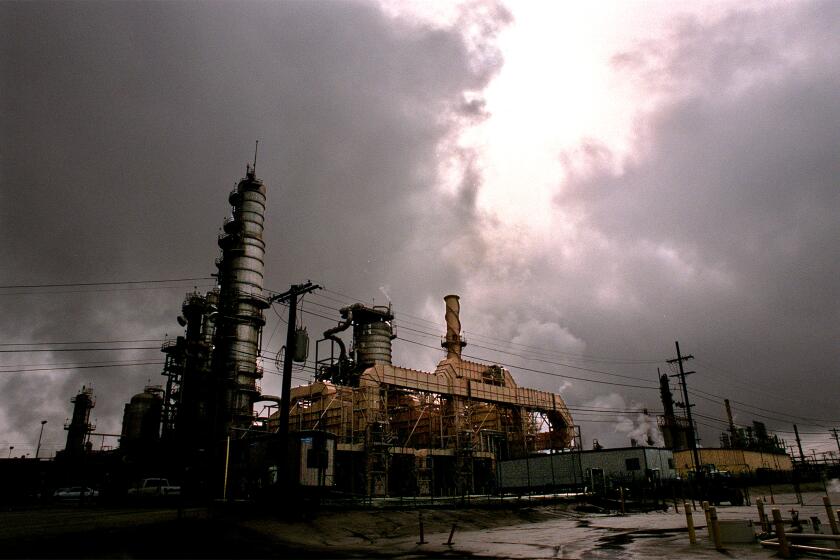Supreme Court signals it may block Biden’s EPA from curbing power plants’ carbon pollution

WASHINGTON — As President Biden heads to Glasgow, Scotland, for a global summit on climate change, the Supreme Court announced Friday that it will hear an appeal from West Virginia and 18 other coal states that seeks to block environmental regulators from limiting carbon pollution spewing from power plants.
The court’s intervention was unusual because the administration has yet to issue any such regulations. But the coalition of conservative states said the court should act now to prevent new regulations that could “force dramatic changes in how and where electricity is produced.”
The case of West Virginia vs. EPA will likely become a major battle over the government’s regulatory authority to restrict greenhouse gases.
The court’s conservatives have long been skeptical of the Environmental Protection Agency’s application of the Clear Air Act to fight climate change. In February 2016, a week before Justice Antonin Scalia died, the court issued a 5-4 order that stopped President Obama’s Clean Power Plan from taking effect. It would have forced broad changes at power plants and required many to switch from using coal.
Executives from six major oil companies and industry trade groups were questioned about the role of fossil fuels in causing climate change.
The coal-producing states insisted that the EPA was overreaching, and the regulation was shelved during the Trump administration. But the coal producers and the 19 states aligned with West Virginia went back to court seeking a ruling that would limit the EPA’s authority. They lost in the U.S. court of appeals but won a review from the Supreme Court.
“This is a tremendous victory for West Virginia and our nation,” West Virginia Atty. Gen. Patrick Morrisey said Friday. “Given the insurmountable costs of President Biden’s proposals, our team is eager to present West Virginia’s case as to why the Supreme Court should define the reach of EPA’s authority once and for all.”
His appeal argued that only Congress, not the EPA, has the authority to revamp the economy to cope with climate change. He said the court should not allow the EPA to have “new and wildly expansive authority” to transform major sectors of the economy.
Biden on Sunday will attend the United Nations climate summit, where countries are expected to announce their latest efforts to cut carbon emissions and shift away from coal toward cleaner sources of energy by the end of the decade. Cutting carbon emissions has been part of the climate measures in Democrats’ final budget bill, which is in flux.
“It’s deeply disturbing to see sufficient votes on the Supreme Court to launch this transparently political attack on Biden’s climate authority as the president heads to Glasgow,” said Kassie Siegel, director of the Center for Biological Diversity’s Climate Law Institute. “The timing of this announcement is a hammer blow to the already fractured reputation of America’s highest court, whose radical right wing now seems to care nothing about either legal precedent or our planet’s future.”
Biden announced earlier this year that the U.S. would slash its emissions by at least half by 2030. But it remains unclear how he would begin to accomplish such an ambitious goal if the court rules against the administration. Democrats in the Senate, who hold a slim majority, have already pared back many proposals to curb emissions as Democratic Sens. Joe Manchin III of West Virginia and Kyrsten Sinema of Arizona objected to measures that would speed America’s transition from oil, gas and coal.
Also on Friday, the court agreed to hear an unusual appeal from Arizona and other conservative states that seeks to revive President Trump’s proposed changes to the “public charge” rule. The long-standing rule denied green cards to immigrants who relied on public assistance, and the Trump administration proposed toughening the rule by adding benefits such as food stamps to the list of disqualifiers.
But judges blocked the changes from taking effect, and they were dropped by the Biden administration. However, lawyers for Arizona appealed in Arizona vs. City and County of San Francisco and said the court should decide whether the conservative states “should be permitted to intervene to defend a rule when the United States ceases to defend.”
Staff writer Anna Phillips contributed to this report.
More to Read
Get the L.A. Times Politics newsletter
Deeply reported insights into legislation, politics and policy from Sacramento, Washington and beyond. In your inbox three times per week.
You may occasionally receive promotional content from the Los Angeles Times.












